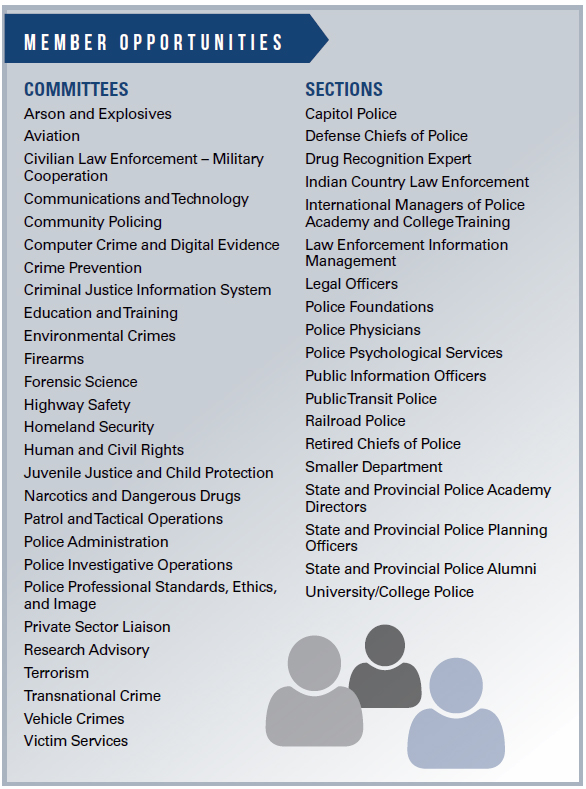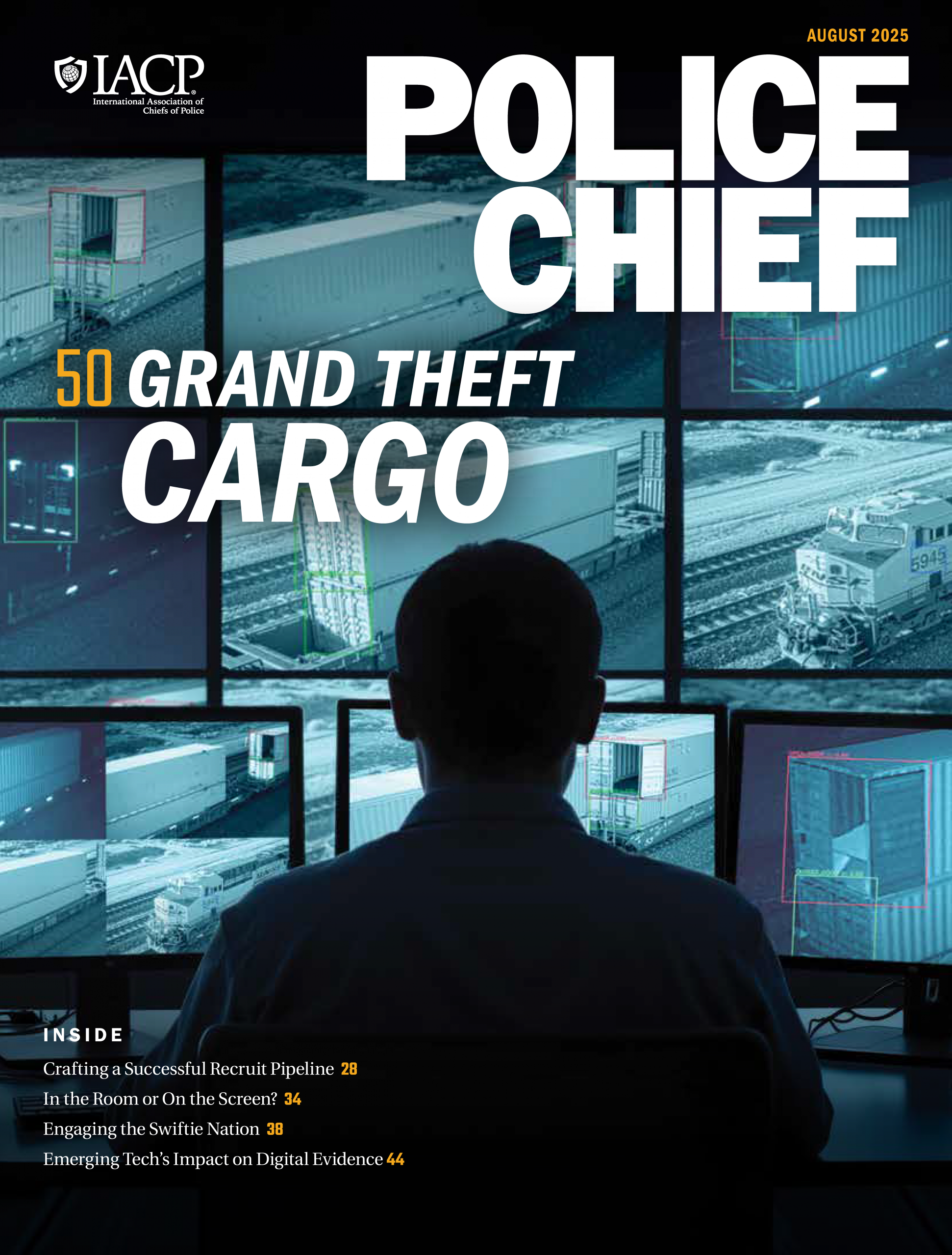Over the past few years, IACP membership has grown significantly, from 24,000 members in 2014, to just over 30,000 members as of June 2017—the highest number of IACP members to date. While membership alone contains many benefits, some members may be wondering how to become more involved with the IACP or how IACP determines its legislative and topical priorities. The answer to both lies with the IACP sections, committees, and policy councils, and, although not the only avenues, our sections, committees, and policy councils are some of the best and most direct ways to become involved with IACP and to have a voice in determining the association’s priorities.
The strength of any membership organization comes from its members. The IACP draws upon the breadth, depth, and diversity of our members’ experiences to address the challenges and priorities of the profession in a timely manner. Both committees and sections play an integral role in the work of this association. The IACP relies on its committee and section members to provide subject matter expertise to address the most crucial issues currently facing law enforcement. These member groups develop best practices, resolutions, reports, white papers, guidelines, fact sheets, critical issue messaging briefs, and brochures. They also support the development of programs and model policies. For example, the following is just a small sample of the training events, publications, and products developed by committees and sections:
• The Law Enforcement Information Technology Section (formerly the Law Enforcement Information Management Section) hosts the IACP Technology Conference every year and provides training, professional development, and a national forum for law enforcement executives, operational managers, and technology and research staff to share best practices and lessons learned on a broad array of new and emerging technologies.
• The Vehicle Crimes Committee will soon release two new documents. Infor-mation Gap Recommendations addresses information gaps pertaining to auto theft and related crimes, data that might be missing to assist in the identification of stolen vehicles and criminals, risks associated with the information gaps, and possible solutions and recommendations to bridge those gaps. The second document, Auto Theft Educational Awareness Report, is designed to educate law enforcement executives, their departments, and the public about the importance of and connection between vehicle crime and subsequent violent crime.
• The Computer Crime and Digital Evidence Committee will soon release Managing Cybersecurity Risk: A Law Enforcement Guide. This committee provides subject matter expertise to the Law Enforcement Cyber Center (www .IACPcybercenter.org).
• The Drug Recognition Expert Section represents professionals associated with drug recognition and hosts the annual Drugs, Alcohol, and Impaired Driving Conference, providing a platform to share management, training, administrative, and practicing concerns in the field of drug recognition and impaired driving.
• Each year the IACP Human and Civil Rights Committee partners with the Law Enforcement Exploring Program to mentor young police explorers at the IACP Annual Conference and Exposition. Explorers shadow their assigned chief at IACP workshops, panels, business meetings, and a scheduled tour of the exposition hall. While it is only a few days, this program can have a profound impact on the life of a young person considering the law enforcement profession, and it exposes each explorer to the vast range of topics addressed by the law enforcement field.

Sections are composed of members from across the world and have a broad focus. For example, there are sections for police personnel who serve in specific types of jurisdictions, like the Indian Country Law Enforcement Section, Capitol Police Section, and University/College Police Section. Other sections represent specific law enforcement–related professions, like the Public Information Officers Section, the Police Physicians Section, and the Legal Officers Section. They are designed to allow all IACP members with an interest (and appropriate qualifications, if applicable) in a specific aspect of law enforcement to share information, experiences, and lessons learned with their peers.
Like sections, committees are composed of IACP members from across the world; however, they typically focus more narrowly on a specific topic and are limited to 30 people. Members must be appointed by the IACP president, and they serve for a defined term (typically, three years).
Each committee falls within a policy council, which is designed to facilitate communication, cooperation, and coordination among the committees of the IACP. Policy councils are intended to serve as a forum for members of the IACP to collaborate on issues of importance to the law enforcement profession in a timely, focused, and flexible manner. Simply put, a policy council is a group of like-topic committees working together for the good of the association. For example, the Technology Policy Council is made up of the Communications and Technology, Computer Crime and Digital Evidence, and the Criminal Justice Information System committees, while the Investigations Policy Council includes the Environmental Crimes, Forensic Science, and Police Investigative Operations committees. There are 10 policy councils in total.
Policy councils are also designed to function on a volunteer-to-volunteer basis. Each policy council is chaired by a member of the IACP Executive Board. While board leadership ensures that the activities of the councils and committees are coordinated and aligned with the overall direction and strategic priorities of the association, it also, more importantly, provides committees with a direct line of communication to the IACP Executive Board.

There are many ways to get more involved with the IACP beyond simply being a member. More information on sections, including a complete listing and description of each section, as well as a link to join sections, is available on IACP’s Sections page. For more information on committees, please visit the IACP’s Committees page or contact the member engagement team. By participating in committees and sections, you help IACP stay abreast of emerging issues and provide a unified voice for the law enforcement community.


